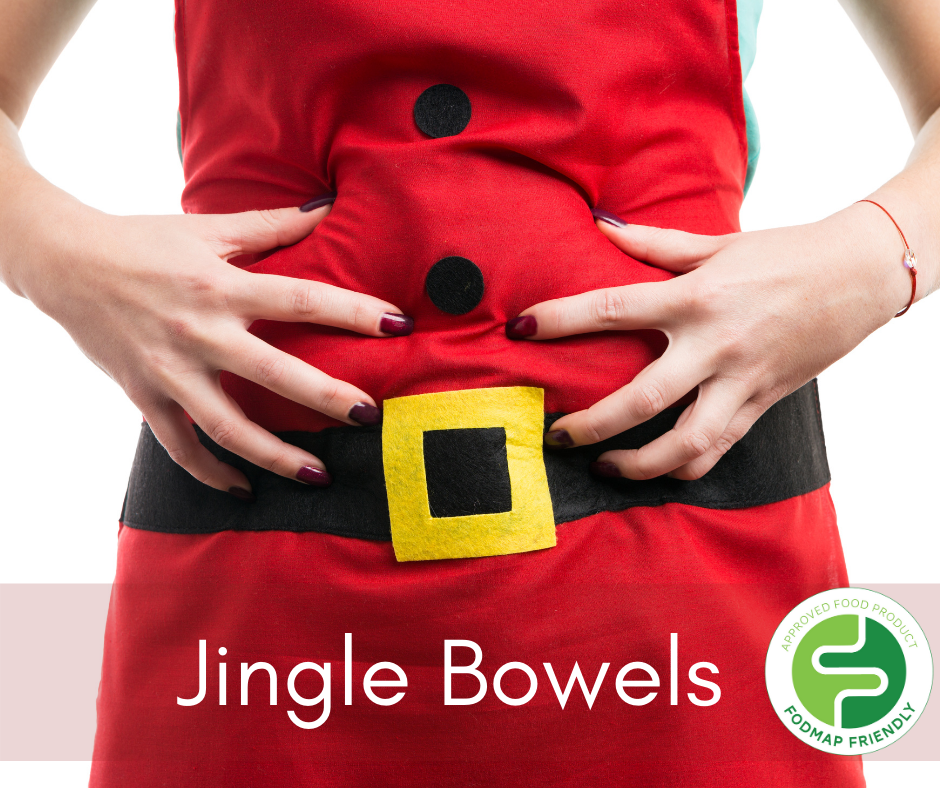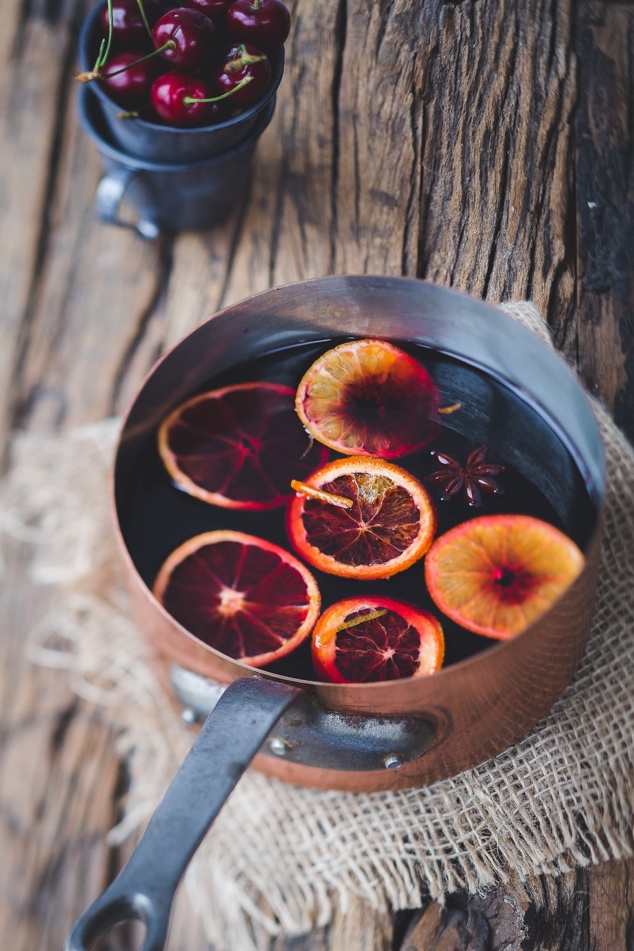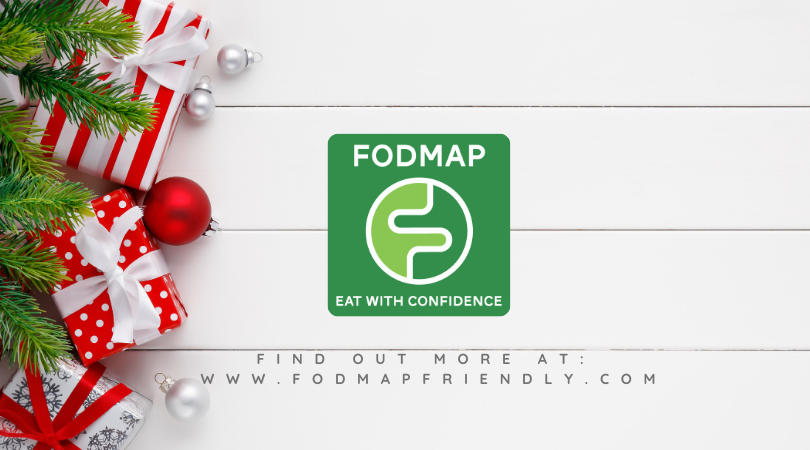A case of jingle bowels – navigating IBS around the festive season
Posted on December 23, 2020
Even for those without IBS, Christmas can bring about stomach problems. The combination of the rich (albeit delicious) food, alcohol, disruption of routine and fun-sized portions can invite a host of uncomfortable gut feelings. For those with IBS, extra caution is recommended to avoid being curled up with an IBS flare over the festive season. Today on the blog, we’re going to unpack why the festive period causes strain on our digestive system, potential symptoms and culprits to look out for. We’ll finish with our FODMAP Friendly top five tips for navigating IBS around the Christmas season.
Why can Christmas gift us strain on our digestive system?
It is usually not one factor in isolation, but a combination of variables that leads to jingle bowels around the festive season. Rich foods such as creamy, fried and high fat foods can be hard to digest. When fatty foods are not absorbed normally, they go to the colon, where they are broken down to fatty acids, causing the colon to release fluid and trigger loose stools or osmotic diarrhoea. The strain of rich foods is not often helped by the quantity in which we eat them around this time – instead of one dessert, we may eat a combination. Or a second or third helping! Instead of one glazed meat, we may eat a few different types! This variety and quantity add further strain to our colon.
Alcohol consumption often heightens around Christmas time too, adding to the Santa’s sack of symptoms. Alcohol, particularly beer and wine may have a high FODMAP content that can trigger IBS symptoms. To add to this, the large intestine isn’t as good at reabsorbing water when alcohol is around which can cause loose stools. What’s more, if you drink alcohol and ingest fibrous and gassy foods at the same time, you may experience a double hit of symptoms. This could include cramping, bloating and diarrhoea from the high fat content of the food and alcohol combined.
Potential symptoms to look out for
There is a ‘big six’ of IBS symptoms typically experienced – diarrhoea, constipation, excessive wind, bloating/distension, cramps and fatigue. Although many of these symptoms are linked, there are also intricacies and specific triggers. We have dedicated blog posts to each of these topics – so if any of them stand out to you and you’d like to learn more, be sure to check out the posts linked above.
Common Christmas culprits
As mentioned before, it is typically the combination of factors rather than a specific food or meal that leads to the added digestive load over the Christmas period. In addition to high fat meals and alcohol which we discussed earlier, here are another five common Christmas culprits to look out for that may exacerbate symptoms.
Dried fruit:
Dried fruit contains concentrated amounts of the monosaccharide, fructose. It can be easy to overeat portions of dried fruit, particularly in baked goods such as fruit cake and traditional fruit Christmas Pudding. Additionally, removing the liquid from high water foods such as grapes shrinks the overall volume of the food, which concentrates the sugar and subsequent FODMAP component
Foods with yeast:
For a basic chemistry lesson, yeast creates carbon dioxide, or gas. The build-up of air in the digestive tract can cause gas production to release the ingested air, which in turn ‘blows up the balloon’, or our stomachs in this case. This extra carbon dioxide can cause cramps and bloating.
Carbonated beverages:
In the same vein as above, drinking large volumes of carbonated beverages could contribute to swallowing excess air too, further blowing up our stomach.
High sugar foods:
Remember that FODMAPs are short-chain sugars, so high sugar desserts and glazes are likely to cause IBS symptoms as they can be improperly digested in the small intestine, leading to fermentation in the large intestine.
Large meals:
A regular sized meal will cause a bit of routine bloating, so eating big portions is likely to cause more bloating by logic. Eating large meals activates the ‘stretch sensors’ we discussed above, which may in turn cause the diaphragm to move inappropriately and gut transit time or gut movement to slow down.
FODMAP Friendly top five tips for navigating IBS around the Christmas season
We’ve discussed a range of common Christmas culprits, so now it’s time to gift you with a few tips on how to navigate these foods and the festive period.
Enjoy, don’t inhale your meals
It is important to remember that our oesophagus doesn’t have teeth! Chewing helps to mechanically break down our food and this process releases digestive enzymes into our saliva. By chewing and eating at a reasonable pace rather than inhaling your food, you are doing ‘your part’ for your digestive system by giving it small chunks of food to work with and break down. A practicable strategy to reduce IBS symptoms is to make an effort to chew each mouthful of food for 30 times before swallowing.
Balance it out
To reduce the IBS symptom load on your digestive system, you may want to instil a bit of balance into the Christmas period. This could mean choosing to drink plain water with meals instead of a carbonated or alcoholic beverage. It could mean eating an abundant main meal but deciding to skip dessert.
Focus on your portions
If you’d like to try a bit of everything and not skimp on any of the Christmas trimmings, you can employ the portion-focussed approach instead. Try what’s on offer at your Christmas meals, but aim to stick to smaller serves of each rather than overeating.
Keep up the exercise
Exercise can be beneficial to IBS symptoms as it can stimulate the natural squeezing of muscles in the intestines. This squeezing can help speed up ‘transit time’ – the time it takes for food to navigate its way through your gut. Speeding up transit time can be helpful in relieving constipation and bloating. Exercise also releases endorphins, leading to a greater sense of calm and wellbeing over the Christmas period which can be stressful at times.
Use a heat pack or take a peppermint capsule such as Mintec
For a quick relief of abdominal pressure caused by bloating or cramps, having a lie down with a hot water bottle or heat pack across your stomach can be a great quick fix. Additionally, Mintec is a peppermint oil capsule that can provide relief of the bloating, abdominal pain, cramping and discomfort associated with IBS. Although these strategies may help in the short term, this is more of a ‘pain relief’ approach than preventative measure.
To wrap up
You can still enjoy the Christmas period while aiming to minimise your jingle bowels. Consider the culprits and tips we’ve described to make the most of your festive season while feeling comfortable and as pain free as possible. Also, remember that many Dietitians and Doctors still work throughout the holiday season, so you can still count on them to help with your individualised needs throughout this time.
Written by: Charlotte Barber (Student Nutritionist)
Reviewed by: Kiarra Martindale (Accredited Practising Dietitian)












